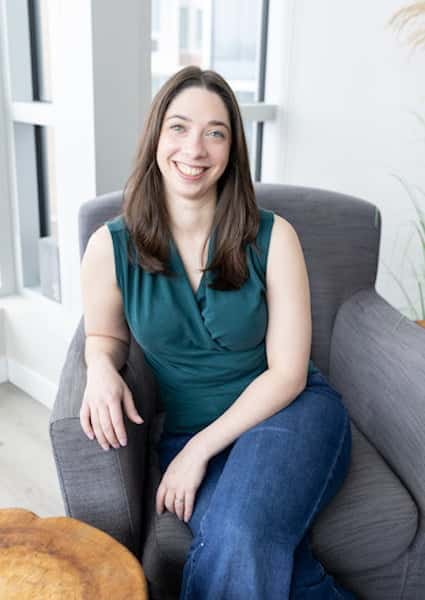Immediate Availability - Open 7 days a week - day, evening and weekend appointments
Immediate Availability - Open 7 days a week - day, evening and weekend appointments


Hi, I'm Leanne! I specialize in supporting teens (13+), adults, seniors, and couples. My approach to counselling is integrative, drawing from multiple therapeutic modalities to create a personalized experience that fits your unique strengths and needs. I believe therapy should feel comfortable and supportive, and I strive to create a space where you feel safe to explore your thoughts and emotions. Clients often describe me as "warm and fuzzy," and I take pride in making sessions feel welcoming and approachable.
Many of my clients have no problem telling me when other relationships in their life are struggling – as I hope they would! But it can be very intimidating to have that same vulnerability with your therapist directly. I provide as many opportunities as possible for my clients to reflect on our therapeutic relationship, and to be honest with me when I’m headed in the wrong direction or not understanding what they need. Repairing relationships, especially the one with your therapist, are such an excellent starting point for healing the self.
I’m a big believer in fitting the approach to the client, rather than the other way around. I often describe my approach as integrative, meaning I integrate pieces from a variety of different therapeutic approaches in order to support the needs and goals of each client, individually.
For example, I pull from Cognitive Behavioural Therapy (CBT), as one of the most well-known and best studied therapeutic approaches of the last 20 years. CBT draws a client’s awareness to the interactions between their thoughts, behaviours, and emotions. However, offshoots of CBT, like Dialectical Behavioural Therapy (DBT) for example, builds on these ideas and uses a more structured approach to address situations when the client might not be able to examine each of those pieces rationally (e.g., intense anxiety, certain personality disorders, etc.). DBT also provides more insight and skills around the client’s relational patterns.
You might also notice that I integrate some of the following:
Acceptance and Commitment Therapy: an action-oriented approach that helps to build your tolerance to- and acceptance of your own emotional reality. We explore values and use them as a guide for your next steps and choices.
Short-Term Solution Focused Therapy: focuses on the ‘here and now’ as well as how to move forward. We’ll likely explore coping strategies that you find valuable, and we’ll work to identify and minimize any stumbling blocks you encounter.
Emotion-Focused Therapy: builds your emotional awareness and explores deeper or ‘primary’ emotions. We’re aiming to get at the root of issues by exploring your history and identifying emotional patterns.
I maintain certifications tailored to specific client populations, including trauma support with AHS' Brain Story and Cornell's Therapeutic Crisis Intervention. Additionally, I've completed training in complex grief and substance-use disorder impacts on families. Currently, I'm enrolled in the U of A's Indigenous Canada course to deepen my cultural understanding and role as a mental health practitioner in a colonized context.
Starting.
Honestly, those first few decisions about whether to go to counselling and who to work with can feel like the most daunting decisions. Working to stay open and vulnerable in those early sessions takes a lot of hard work.
To make it easier, I create a safe space where you can share how you feel without feeling like you're on trial. It's less about finding the ‘truth’ and more about understanding each other's perspectives. This way, you and your partner can work as a team against the problem, rather than seeing the other person as the problem.
My therapy approach with couples is primarily informed by the Gottman Method, known for its evidence-based strategies to strengthen relationships and manage conflicts effectively. I also integrate elements from Emotionally Focused Therapy (EFT), which focuses on creating secure emotional bonds and fostering communication patterns that promote understanding and connection.
In addition to these modalities, I bring valuable experience in addressing blended family dynamics and parenting concerns specific to blended families, including the unique challenges that arise in couples' relationships related to fostering and/or adopting children.
Parent/Parents
When working solely with parents, I draw from various systemic therapy approaches like IPScope (IP standing for Interpersonal Patterns) to identify certain repeated patterns found in relationships. This helps pinpoint areas where parents might feel ‘stuck'. This lets us then come up with strategies for transitioning into healthier patterns. I emphasize empowerment, assisting parents in recognizing and addressing their own interpersonal patterns to foster more effective communication and support within the family system.
Parent and Child
When working with parent(s) and child together, I describe my role as more of a ’translator', bridging the gap between generations. Here, I integrate more strategies from Acceptance and Commitment Therapy. Together we'll explore values and relational hurdles, aiming to mutual understanding and practice perspective taking. I encourage everyone to consider this type of approach as a series of experiments, where we test different techniques, ensuring they resonate with both parents and children, and create a supportive environment for growth and positive change.
This is a tricky question because there’s no one answer that fits everyone. We’ll be focused on the goals you have for counselling, and those can be very different for each person. We’re aiming to make some progress every time we meet, however, progress won’t always feel the same as relief, and progress is almost never linear. I’ll be checking in with you regularly about where you’re seeing the most improvement, and to confirm if we’re heading in the right direction.
I became a therapist because I was inspired by the work of other counsellors and mental health professionals. I was able to see how genuine support can lead to transformative change. Individuals who had struggled with depression, anxiety, and relational issues were able to view their struggles from a new perspective, and the changes they made lasted far beyond their counselling appointments. I know my clients deserve to have someone unequivocally in their corner, cheering them on and believing in their potential, because I’ve seen the profound impact that can have on their future.
The environment I aim to create is one where individuals can come as they are, without fear of judgment or the need to hide any part of themselves. Together we’ll be creating a space where change becomes possible and where motivation is nurtured and celebrated.
"*" indicates required fields